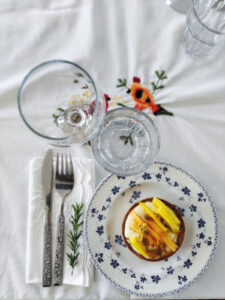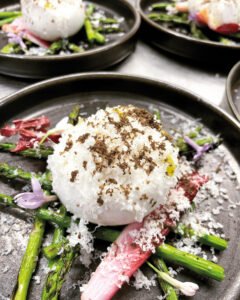Hidden around the city, a smorgasbord of supper clubs are ready to be discovered – Miriam Balanescu tucks in
The drinks are already flowing (maybe unsurprisingly) and music plays loudly through the speakers by the time I arrive at Brewboard’s pop-up taproom on Green Street. There’s a sense of anticipation as new arrivals pile into the space, conversations starting up between old friends and strangers. We sit down according to the seating plan and, as the night sets in, the evening is as much a conversational feast as a gastronomic adventure, featuring stout-infused Italian bread, curry-flavoured taralli and sun-dried tomato panettone.
I’m here for an event organised by Pina Broccoli Anaia of One Two Culinary Stew, a marrying of the taste-bud-tickling brews at this craft beer staple and the tasty treats found at Signorelli’s Il Mercato. “I’m the person in the middle,” Pina tells me over the music. “I put it all together and take away the admin!”
This is just one of many tantalising culinary events cropping up around the city. While not a supper club per se, these foodie voyages designed by Pina have grown out of a supper club tradition in Cambridge. Such events are difficult to define, with more chefs and restaurants wanting a taste of the action, but originally they were organised by home cooks inviting food lovers to their houses to sample their very finest.
Le Bistrot Clandestin, hosted by Gourmandises Académie’s Corinne Payet, is one of Cambridge’s more traditional supper clubs, with guests gathering in the pâtissier’s sitting room around one immense table, decked out with special wares. “Every time, people have a conversation about the tablecloth!” she laughs.
“I remember sitting around the table every night with my parents and my brother,” recalls Corinne. “It was all about the food. What I wanted to do with the bistro was a similar thing, people sitting around the table and sharing a plate of food. The bistro isn’t about fine dining. It’s not about a pretty place, or pretty presentations. It’s just simple food, shared simply.”
Raised on Réunion Island, she started creating her own French pastries and confections, often with a Creole twist – her passion fruit tart winning a Great Taste award.
“What was missing from the patisserie was my culinary background,” Corinne explains. And so, she founded her own cookery school – run from home – with a supper club following in 2018.
 “It was a way for me to introduce Réunion food to the English palates,” Corinne says of her monthly bistros, which alternate between French and Creole cuisine. “The British palate is an adventurous one. In France, it’s still a very traditional market. I wanted the proper home-cooked French food without the faff.
“It was a way for me to introduce Réunion food to the English palates,” Corinne says of her monthly bistros, which alternate between French and Creole cuisine. “The British palate is an adventurous one. In France, it’s still a very traditional market. I wanted the proper home-cooked French food without the faff.
“I could have gone and got an industrial unit, but I didn’t want to do that,” claims Corinne. “I always say when people come to Réunion, don’t go to the restaurants, don’t go to the fancy places with lovely decor, because this is where you are a lot less likely to enjoy real Réunion culture. If you’re invited to a Creole house, there’s less formality. All the pots will be on the table, we don’t serve, and everybody will be helping themselves. If a next-door neighbour knocks on the door while you’re in the middle of eating, they will probably join. That’s what I wanted to create and why, for me, it was important to run the supper club from home.”
As the supper club has evolved, it’s not just humble home cooks who are hosting. “A supper club is an occasion generally when all the planets align, for me,” says Parker’s Tavern head chef, Tristan Welch. “It’s when you’ve got the right cook in the right place at the right time with the right people. That’s what’s really wonderful: they tend to be unique every time.”
His popular Rubbish Cooks Supper Club grew out of a pub trip with fellow chef Alex Rushmer. “It all started because I was offered chicken legs for free,” says Tristan. “I was like, first of all, thank you very much. Then I asked why. They said they’re surplus to the food chain, because the demand for chicken breasts is so high.”
“We never know what we’ve got until the actual day,” Tristan adds, explaining how the menu requires some foodie thinking on one’s feet. “More often than not, it’s quite surprising what suppliers are able to send us over, and that normally arrives about two o’clock in the afternoon with the chefs. We create a spectacular, unique menu from things that wouldn’t have made it to the tabletop normally.”
This creativity is absolutely at the heart of supper clubs. Tristan recalls a pop-up fish and chip shop he ran on the beach in the Caribbean, or a supper club run in the basement of a nightclub with sole entry through the cloakroom.
Elsewhere, some of Cambridge’s most thrilling cuisine is being cooked up from within the secluded walls of supper clubs. Former Midsummer House chef Ben Sulston joined forces with Alex Harris and Lindsay Scrivener of Puddini last year to create their Hidden supper club, a hotbed of gastronomic talent. Held in the unlikely setting of a Willingham car park, the team have transformed an unassuming space into a sleek venue where Ben, Alex and now their new up-and-coming chefs can show off serious culinary prowess – without any of the pomp.
“The idea is to create a nice, relaxed environment where people can enjoy themselves,” confirms Ben. “We don’t want it to be stuffy. It just needs to be nice food without feeling like you’ve got to sit up, wear a suit and not talk to each other.”
When asked about the difference between supper clubs and a restaurant’s usual offerings, Ben says: “Ultimately, the  difference is you get the time to talk to people. I come up and talk through all the dishes. And then, at the end, I generally go around and have a chat with everybody. It’s the interaction you have with the person who’s cooking the food.”
difference is you get the time to talk to people. I come up and talk through all the dishes. And then, at the end, I generally go around and have a chat with everybody. It’s the interaction you have with the person who’s cooking the food.”
Serving up seasonal and local produce – including some more intriguing finds such as ‘micro-grown’ greens – Hidden has now introduced a new edition, providing a platform for its budding trainee cooks. “I have always been passionate about developing junior chefs and so has Alex,” enthuses Ben. “It’s a great way to showcase what they do.”
It’s inevitable that great food will attract great lovers of food often – at supper clubs – united around one large table. While the whole of the hospitality industry took a devastating blow over the past two years, the appetite for interesting experiences has increased post-pandemic.
“People realised that what is important is making connections – real connections,” explains Corinne. “What’s really interesting about the bistro is that when people come around, they’re all a bit shy, which I can understand, but the act of sitting around that big table pushes people to interact with each other. At the beginning of the meal, people are complete strangers; at the end, they’re always friends.”

